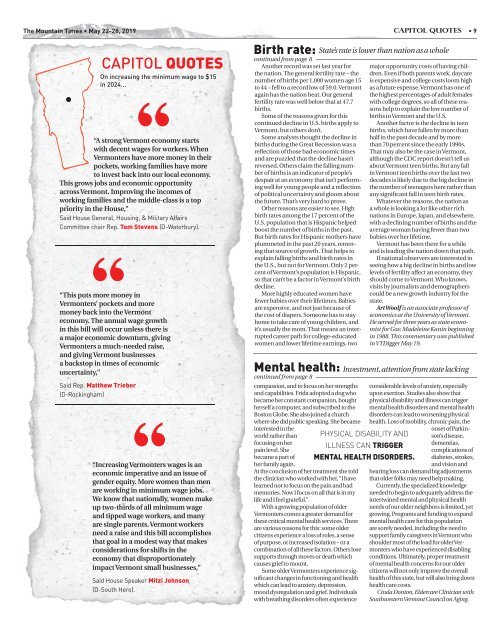Mountain Times - Volume 48, Number 21: May 22-28, 2019
Create successful ePaper yourself
Turn your PDF publications into a flip-book with our unique Google optimized e-Paper software.
The <strong>Mountain</strong> <strong>Times</strong> • <strong>May</strong> <strong>22</strong>-<strong>28</strong>, <strong>2019</strong> CAPITOL QUOTES • 9<br />
CAPITOL QUOTES<br />
“A strong Vermont economy starts<br />
with decent wages for workers. When<br />
Vermonters have more money in their<br />
pockets, working families have more<br />
to invest back into our local economy.<br />
This grows jobs and economic opportunity<br />
across Vermont. Improving the incomes of<br />
working families and the middle-class is a top<br />
priority in the House,”<br />
Said House General, Housing, & Military Affairs<br />
Committee chair Rep. Tom Stevens (D-Waterbury).<br />
“This puts more money in<br />
Vermonters’ pockets and more<br />
money back into the Vermont<br />
economy. The annual wage growth<br />
in this bill will occur unless there is<br />
a major economic downturn, giving<br />
Vermonters a much-needed raise,<br />
and giving Vermont businesses<br />
a backstop in times of economic<br />
uncertainty,”<br />
Said Rep. Matthew Trieber<br />
(D-Rockingham)<br />
On increasing the minimum wage to $15<br />
in 2024...<br />
“Increasing Vermonters wages is an<br />
economic imperative and an issue of<br />
gender equity. More women than men<br />
are working in minimum wage jobs.<br />
We know that nationally, women make<br />
up two-thirds of all minimum wage<br />
and tipped wage workers, and many<br />
are single parents. Vermont workers<br />
need a raise and this bill accomplishes<br />
that goal in a modest way that makes<br />
considerations for shifts in the<br />
economy that disproportionately<br />
impact Vermont small businesses,”<br />
Said House Speaker Mitzi Johnson<br />
(D-South Hero).<br />
Birth rate:<br />
continued from page 8<br />
Another record was set last year for<br />
the nation. The general fertility rate – the<br />
number of births per 1,000 women age 15<br />
to 44 – fell to a record low of 59.0. Vermont<br />
again has the nation beat. Our general<br />
fertility rate was well below that at 47.7<br />
births.<br />
Some of the reasons given for this<br />
continued decline in U.S. births apply to<br />
Vermont, but others don’t.<br />
Some analysts thought the decline in<br />
births during the Great Recession was a<br />
reflection of those bad economic times<br />
and are puzzled that the decline hasn’t<br />
reversed. Others claim the falling number<br />
of births is an indicator of people’s<br />
despair at an economy that isn’t performing<br />
well for young people and a reflection<br />
of political uncertainty and gloom about<br />
the future. That’s very hard to prove.<br />
Other reasons are easier to see. High<br />
birth rates among the 17 percent of the<br />
U.S. population that is Hispanic helped<br />
boost the number of births in the past.<br />
But birth rates for Hispanic mothers have<br />
plummeted in the past 20 years, removing<br />
that source of growth. That helps to<br />
explain falling births and birth rates in<br />
the U.S., but not for Vermont. Only 2 percent<br />
of Vermont’s population is Hispanic,<br />
so that can’t be a factor in Vermont’s birth<br />
decline.<br />
More highly educated women have<br />
fewer babies over their lifetimes. Babies<br />
are expensive, and not just because of<br />
the cost of diapers. Someone has to stay<br />
home to take care of young children, and<br />
it’s usually the mom. That means an interrupted<br />
career path for college-educated<br />
women and lower lifetime earnings, two<br />
Mental health:<br />
continued from page 8<br />
compassion, and to focus on her strengths<br />
and capabilities. Frida adopted a dog who<br />
became her constant companion, bought<br />
herself a computer, and subscribed to the<br />
Boston Globe. She also joined a church<br />
where she did public speaking. She became<br />
interested in the<br />
world rather than<br />
focusing on her<br />
pain level. She<br />
became a part of<br />
her family again.<br />
At the conclusion of her treatment she told<br />
the clinician who worked with her, “I have<br />
learned not to focus on the pain and bad<br />
memories. Now I focus on all that is in my<br />
life and I feel grateful.”<br />
With a growing population of older<br />
Vermonters comes a greater demand for<br />
these critical mental health services. There<br />
are various reasons for this: some older<br />
citizens experience a loss of roles, a sense<br />
of purpose, or increased isolation – or a<br />
combination of all these factors. Others lose<br />
supports through moves or death which<br />
causes grief to mount.<br />
Some older Vermonters experience significant<br />
changes in functioning and health<br />
which can lead to anxiety, depression,<br />
mood dysregulation and grief. Individuals<br />
with breathing disorders often experience<br />
State’s rate is lower than nation as a whole<br />
major opportunity costs of having children.<br />
Even if both parents work, daycare<br />
is expensive and college costs loom high<br />
as a future expense. Vermont has one of<br />
the highest percentages of adult females<br />
with college degrees, so all of these reasons<br />
help to explain the low number of<br />
births in Vermont and the U.S.<br />
Another factor is the decline in teen<br />
births, which have fallen by more than<br />
half in the past decade and by more<br />
than 70 percent since the early 1990s.<br />
That may also be the case in Vermont,<br />
although the CDC report doesn’t tell us<br />
about Vermont teen births. But any fall<br />
in Vermont teen births over the last two<br />
decades is likely due to the big decline in<br />
the number of teenagers here rather than<br />
any significant fall in teen birth rates.<br />
Whatever the reasons, the nation as<br />
a whole is looking a lot like other rich<br />
nations in Europe, Japan, and elsewhere,<br />
with a declining number of births and the<br />
average woman having fewer than two<br />
babies over her lifetime.<br />
Vermont has been there for a while<br />
and is leading the nation down that path.<br />
If national observers are interested in<br />
seeing how a big decline in births and low<br />
levels of fertility affect an economy, they<br />
should come to Vermont. Who knows,<br />
visits by journalists and demographers<br />
could be a new growth industry for the<br />
state.<br />
Art Woolf is an associate professor of<br />
economics at the University of Vermont.<br />
He served for three years as state economist<br />
for Gov. Madeleine Kunin beginning<br />
in 1988. This commentary was published<br />
in VTDigger <strong>May</strong> 19.<br />
Investment, attention from state lacking<br />
PHYSICAL DISABILITY AND<br />
ILLNESS CAN TRIGGER<br />
MENTAL HEALTH DISORDERS.<br />
considerable levels of anxiety, especially<br />
upon exertion. Studies also show that<br />
physical disability and illness can trigger<br />
mental health disorders and mental health<br />
disorders can lead to worsening physical<br />
health. Loss of mobility, chronic pain, the<br />
onset of Parkinson’s<br />
disease,<br />
dementias,<br />
complications of<br />
diabetes, strokes,<br />
and vision and<br />
hearing loss can demand big adjustments<br />
that older folks may need help making.<br />
Currently, the specialized knowledge<br />
needed to begin to adequately address the<br />
intertwined mental and physical health<br />
needs of our older neighbors is limited, yet<br />
growing. Programs and funding to expand<br />
mental health care for this population<br />
are sorely needed, including the need to<br />
support family caregivers in Vermont who<br />
shoulder most of the load for older Vermonters<br />
who have experienced disabling<br />
conditions. Ultimately, proper treatment<br />
of mental health concerns for our older<br />
citizens will not only improve the overall<br />
health of this state, but will also bring down<br />
health care costs.<br />
Cinda Donton, Eldercare Clinician with<br />
Southwestern Vermont Council on Aging.

















